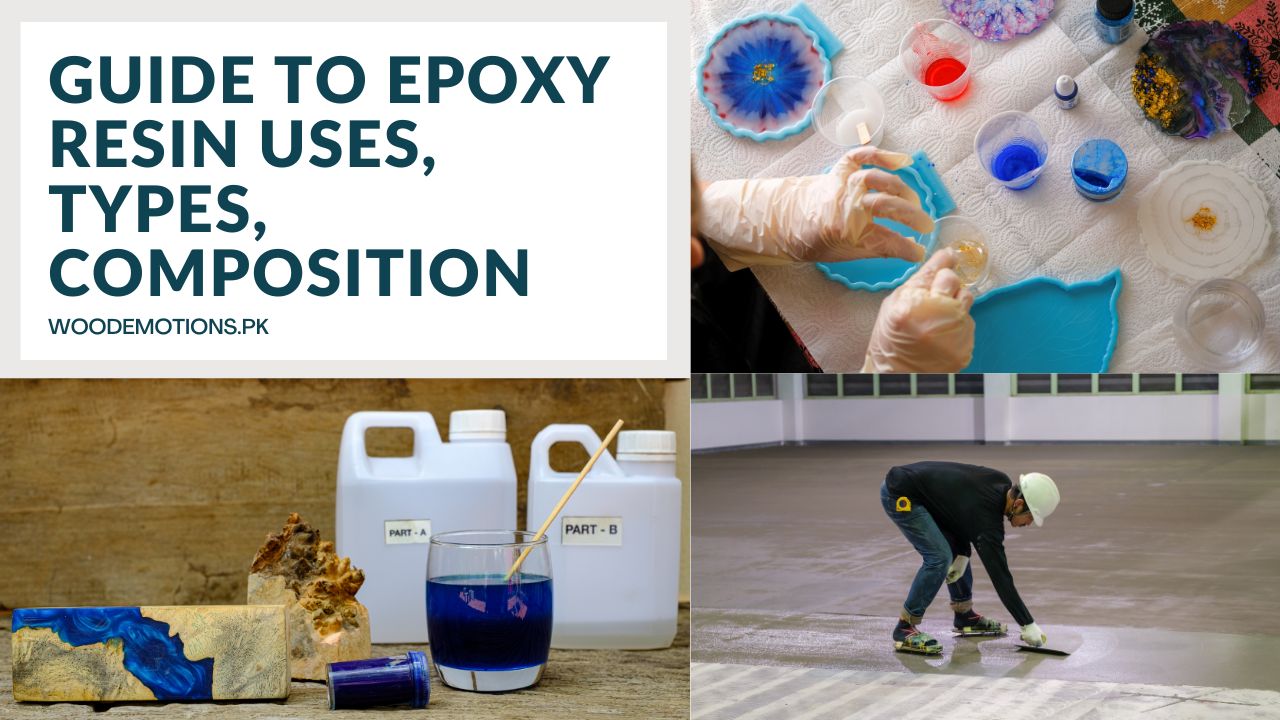Epoxy resin, a staple in modern industry and craftsmanship, embodies versatility and strength like other materials. Its widespread use, from construction to art, hinges on its unique composition and properties.
Epoxy resin, a synthetic material, is known for its strong adhesive properties and durability, formed through the reaction of epoxide compounds with a curing agent.
In this article, we delve into the fundamental aspects of epoxy resin, exploring its composition, properties, and applications. Additionally! Explore our Epoxy collection page for all your needs! Find a diverse range of high-quality epoxy products tailored to suit your projects and requirements.
What is Epoxy Resin?
Epoxy resin is a versatile synthetic material widely used across various industries due to its exceptional properties. It's a thermosetting polymer formed through the reaction of epoxide compounds with a curing agent. This reaction results in a rigid, cross-linked structure known for its outstanding mechanical and chemical properties.
Composition of Epoxy Resin
Epoxy resin typically consists of two primary components: the resin itself and the curing agent. The epoxy resin serves as the base material, providing the primary structure, while the curing agent initiates the cross-linking process, transforming the liquid resin into a solid polymer.
- Epoxy Resin's Chemical Makeup
At its core, epoxy resin contains epoxide functional groups, which are reactive sites capable of forming covalent solid bonds during curing. These epoxide groups react with the curing agent, creating a three-dimensional network that gives epoxy resin its robust properties.
- Cross-Linking Process
During curing, the epoxide groups of the resin molecules undergo a chemical reaction with the curing agent, forming cross-links between adjacent molecules. This cross-linking process is crucial for imparting strength and stability to the final epoxy resin product.
- Polymerization Reaction
The reaction between the epoxide groups and the curing agent typically involves polymerization, where smaller molecules (monomers) join to form larger polymer chains. This polymerization reaction is exothermic, generating heat as it progresses and contributing to curing.

Properties of Epoxy Resin
Epoxy resin exhibits diverse properties that make it highly desirable for various applications. These properties include:
- High Mechanical Strength: Epoxy resin is renowned for its exceptional mechanical strength, making it suitable for structural applications where durability is paramount.
- Chemical Resistance: Epoxy resin is highly resistant to chemicals, including acids, alkalis, and solvents, making it ideal for use in environments where exposure to corrosive substances is a concern.
- Adhesion: Epoxy resin forms strong bonds with a wide range of substrates, including metals, plastics, ceramics, and wood, making it an excellent choice for adhesives and coatings.
- Electrical Insulation: Epoxy resin exhibits excellent electrical insulation properties, making it suitable for electronics and electrical engineering applications.
- Low Shrinkage: Epoxy resin experiences minimal shrinkage during curing, ensuring dimensional stability and accuracy in molded parts and castings.
Temperature Resistance
Epoxy resin can withstand a wide range of temperatures, from extreme cold to high heat, without significantly degrading its properties. This thermal stability makes it suitable for applications where temperature fluctuations are typical.
- UV Resistance
While epoxy resin offers excellent resistance to most environmental factors, it may degrade when exposed to prolonged ultraviolet (UV) radiation. Therefore, UV stabilizers are often incorporated into epoxy formulations for outdoor applications to enhance longevity.
- Water Resistance
Epoxy resin exhibits high water resistance, making it suitable for marine and underwater applications, such as boat hulls, watercraft repairs, and marine infrastructure.
Here's the forum link I provided for additional assistance. Feel free to check out the discussions for more insights and tips on epoxy resin applications!
What Is Epoxy Resin Made Of?

Epoxy resin, a versatile material used in various industries, comprises several vital ingredients. Understanding its composition sheds light on its properties and applications.
Components of Epoxy Resin
Epoxy resins typically consist of four main ingredients, each playing a crucial role in the formulation and performance of the final product:
1. Monomeric Resin
The monomeric resin serves as the primary building block of epoxy resin. It contains epoxide functional groups, reactive sites that undergo polymerization to form the solid epoxy matrix. Standard monomeric resins include bisphenol A (BPA) epoxy, bisphenol F (BPF) epoxy, and novolac epoxy.
2. Hardener
The hardener, also known as the curing agent or cross-linker, initiates the polymerization reaction with the monomeric resin. It reacts with the epoxide groups in the resin, forming cross-links between the polymer chains.
This cross-linking process transforms the liquid resin into a solid polymer with desirable properties such as strength and durability.
3. Accelerator
An accelerator may be added in some formulations to expedite the curing process. The accelerator enhances the rate of chemical reaction between the monomeric resin and the hardener, reducing the curing time and allowing for faster production cycles.
However, excessive use of accelerators can lead to reduced pot life and increased exothermic heat generation during curing.
4. Plasticizer
A plasticizer may be incorporated into epoxy resin formulations to modify the hardness and flexibility of the cured product. Plasticizers are additives that improve the flow and workability of the resin, making it easier to handle and process.
By adjusting the concentration of the plasticizer, manufacturers can tailor the mechanical properties of the epoxy resin to suit specific application requirements.
Types of Epoxy Resin
Epoxy resin comes in various types, each with unique characteristics and applications. Let's explore these types in simple terms:

1. Bisphenol Epoxy Resins
Bisphenol-A diglycidyl ether (DGEBA) is a standard epoxy resin made from bisphenol-A and epichlorohydrin. It has a low molecular weight, making it suitable for many applications.
2. Aliphatic Epoxy Resins
Aliphatic epoxy resins are produced from epoxidized vegetable oils or cycloaliphatic epoxides. They have high oxirane content, which gives them weather resistance, low viscosity, and good durability.
3. Novolac Epoxy Resins
Novolac epoxy resins are made from the reaction of phenol and formaldehyde. They are free of solvents and volatile organic compounds (VOCs), making them safe to use. They offer high adhesive strength and durability.
4. Halogenated Epoxy Resins
Halogenated epoxy resins are mixed with fluorinated or brominated compounds for unique properties like flame resistance. However, their commercial use is limited due to low glass transition temperature (Tg) and cost.
5. Epoxy Resin Diluents
Epoxy resin diluents are created by glycosylation of polyols or aliphatic alcohols. They come in difunctional, monofunctional, or higher functionality varieties and are used to adjust viscosity and other properties of epoxy formulations.
6. Glycidyl amine Epoxy Resins
Glycidyl amine epoxy resins are formed from the reaction between epichlorohydrin and aromatic amines. They have high functionality levels and are easier to process due to their lower viscosity.
Uses of Epoxy Resin
Epoxy resin is widely used across various applications due to its versatility and excellent properties. Here are some common uses:
Adhesives and Sealants
Epoxy resin is a strong adhesive for bonding materials like metals, plastics, wood, and ceramics. It creates durable bonds that are resistant to environmental conditions.
Coatings and Paints
Epoxy resin provides a glossy, durable finish as a coating or paint, protecting surfaces from chemicals, abrasion, and moisture. It's commonly used on garage floors, countertops, and industrial equipment.
find out how epoxy flooring is done!
Composite Materials
In industries such as aerospace and automotive, epoxy resin is used to manufacture lightweight yet strong components by embedding reinforcements like fiberglass or carbon fiber.
Electronics and Electrical Components
Epoxy resin's excellent electrical insulation properties make it ideal for protecting electronics and electrical components from moisture and corrosion.
Construction and Building Materials
Epoxy resin enhances the strength and durability of concrete and mortar in construction applications. It's also used for repairing concrete structures and anchoring bolts.
Art and Crafts
Artists use epoxy resin to create glossy finishes on paintings, resin jewelry, and decorative items like coasters and tabletops.
Marine Applications
Epoxy resin is used in marine applications to repair boat hulls, seal joints, and protect marine structures from corrosion.
Medical Devices and Dental Materials
Epoxy resin is biocompatible, making it safe for medical prosthetics, dental fillings, and custom medical devices.
Here's another forum link for your convenience. Join the discussion to gain valuable insights and learn about the various differences in epoxy resin formulations!
FAQs (Frequently Asked Questions)
1. Is epoxy resin safe to use indoors?
Absolutely! When used in well-ventilated areas and with proper safety precautions, epoxy resin poses minimal health risks.
2. Can epoxy resin be colored?
Yes, epoxy resin can be tinted with various pigments and dyes to achieve custom colors and effects.
3. How long does it take for epoxy resin to cure?
Curing times vary depending on temperature, humidity, and the specific resin formulation. Generally, epoxy resin can cure within a few hours to several days.
Read more about drying time of epoxy resin
4. Can epoxy resin withstand high temperatures?
Yes, epoxy resin exhibits excellent heat resistance, making it suitable for applications where exposure to elevated temperatures is expected.
5. Is epoxy resin recyclable?
While epoxy resin is not easily recyclable due to its cross-linked structure, efforts are underway to develop sustainable alternatives and recycling methods for epoxy-based materials.
In Conclusion
Epoxy resin is a testament to human ingenuity, offering exceptional strength and durability through its adhesive properties, forming a cross-linked structure upon reaction with curing agents.








